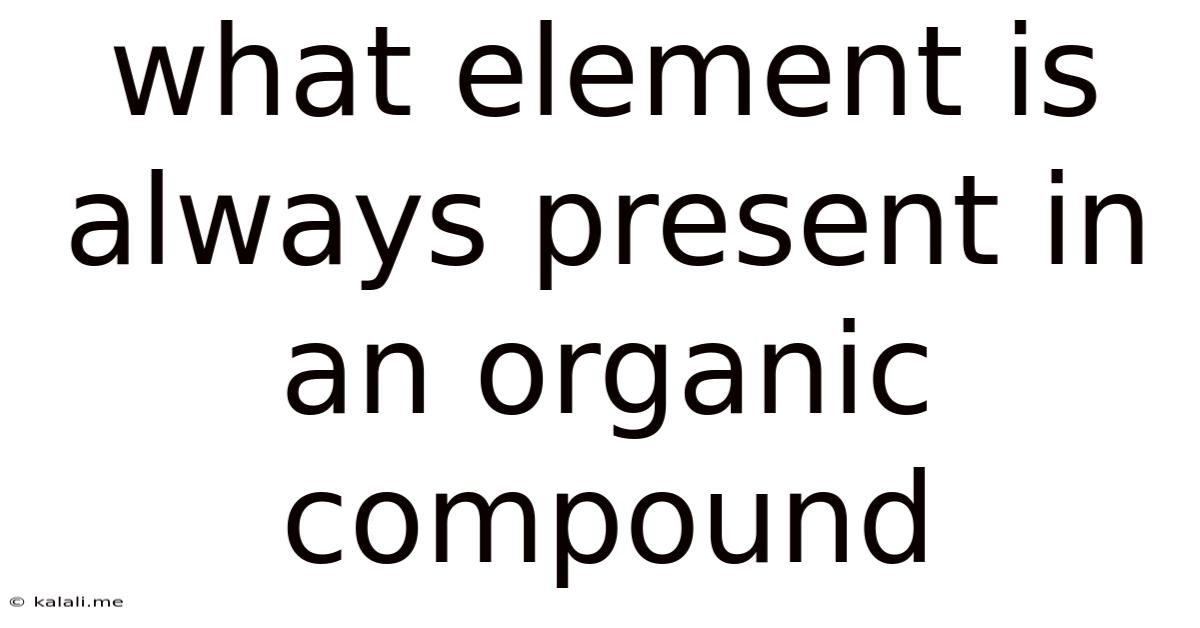What Element Is Always Present In An Organic Compound
Kalali
Jun 11, 2025 · 3 min read

Table of Contents
What Element is Always Present in an Organic Compound?
Organic chemistry can seem daunting, filled with complex molecules and reactions. But at its core, understanding organic compounds boils down to one key element: carbon. This article will delve into why carbon is the fundamental building block of all organic molecules, exploring its unique properties and the implications for the vast diversity of life and synthetic organic materials.
The Ubiquitous Carbon Atom: The Foundation of Organic Chemistry
The defining characteristic of an organic compound is the presence of carbon atoms bonded to other carbon atoms, or to atoms of other elements such as hydrogen, oxygen, nitrogen, sulfur, and phosphorus. While some simple carbon-containing compounds, like carbon dioxide (CO₂) and carbonates, are considered inorganic, the vast majority of compounds containing carbon are classified as organic. This distinction, although seemingly arbitrary, reflects the fundamental role carbon plays in building the complex molecules of life and a wide array of synthetic materials.
Why Carbon? Unique Properties for Organic Molecule Formation
Carbon's unique ability to form a vast array of molecules stems from its electronic configuration and bonding capabilities. Specifically:
- Tetravalency: Carbon has four valence electrons, allowing it to form four covalent bonds with other atoms. This tetravalency enables carbon atoms to bond with each other, creating long chains, branched structures, and rings – the backbone of all organic molecules.
- Catentation: This is the ability of carbon atoms to bond with other carbon atoms to form long chains and rings. This property is unparalleled among other elements and is crucial to the complexity of organic molecules.
- Isomerism: Carbon's ability to form multiple bonds (single, double, and triple bonds) and arrange atoms in different spatial orientations leads to isomerism. Isomers are molecules with the same molecular formula but different structural arrangements, leading to vastly different properties. This contributes significantly to the incredible diversity of organic compounds.
- Bond Strength: Carbon-carbon bonds are relatively strong, contributing to the stability of organic molecules. This stability is essential for the functioning of biological systems and the longevity of many synthetic organic materials.
Beyond Carbon: The Supporting Cast of Elements
While carbon is the central player, other elements play crucial supporting roles in organic chemistry. Hydrogen is incredibly common, frequently bonding with carbon atoms to complete their valence shells. Oxygen, nitrogen, sulfur, and phosphorus are also frequently encountered, contributing to the diversity of functional groups and molecular properties. These functional groups, such as hydroxyl (-OH), carboxyl (-COOH), and amino (-NH2), impart specific chemical reactivity and properties to organic molecules.
Examples of Organic Compounds & their Applications
The presence of carbon as the backbone element underpins the vast diversity of organic compounds, each with unique properties and applications:
- Carbohydrates: Sugars, starches, and cellulose are essential for energy storage and structural support in living organisms.
- Lipids: Fats, oils, and waxes are vital for energy storage, insulation, and cell membrane structure.
- Proteins: Proteins are crucial for a vast array of biological functions, including enzymatic catalysis, structural support, and immune response.
- Nucleic Acids: DNA and RNA are the fundamental molecules of heredity, storing and transmitting genetic information.
- Synthetic Polymers: Plastics, synthetic fibers, and rubbers are just a few examples of synthetic organic compounds with widespread applications.
In conclusion, the presence of carbon is the defining characteristic of organic compounds. Its unique bonding capabilities, including tetravalency and catentation, enable the formation of the vast array of molecules that form the basis of life and countless synthetic materials. Understanding carbon's central role is fundamental to comprehending the complexities and applications of organic chemistry.
Latest Posts
Latest Posts
-
How Many Oz In A Lb Of Pasta
Jul 01, 2025
-
What Year Was I Born In If Im 19
Jul 01, 2025
-
How Many Cups Is 238 Grams Of Miralax Powder
Jul 01, 2025
-
How Much Is Half A Billion Dollars
Jul 01, 2025
-
How Many Days Are In 9 Years
Jul 01, 2025
Related Post
Thank you for visiting our website which covers about What Element Is Always Present In An Organic Compound . We hope the information provided has been useful to you. Feel free to contact us if you have any questions or need further assistance. See you next time and don't miss to bookmark.